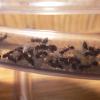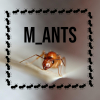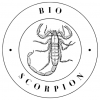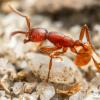- Formiculture.com
- Forums
- Gallery
- Members
- Member Map
- Chat

Sick of Camponotus sp (shaking leg, totter, infectivity and die all)
Started By
missuapple
, Sep 13 2022 4:38 AM
sick totter shake leg
16 replies to this topic
#1
 Offline
-
Posted September 13 2022 - 4:38 AM
Offline
-
Posted September 13 2022 - 4:38 AM
I kept hundreds of variety of Camponotus sp colonies. Many of them died of the same sick with sumpton such as: ant stand still and shake their leg(s), tottering walk, or walk as crawling with 6 legs stretching.
I think they got infected bu fungi. I noticed that with both high and low humid rate,clean or dirty, new or old nest that sick still be there unexpectable.
It happen more with Camponotus family.
Can you guy share me your experiment, cause and solution?
Thanks so much
I think they got infected bu fungi. I noticed that with both high and low humid rate,clean or dirty, new or old nest that sick still be there unexpectable.
It happen more with Camponotus family.
Can you guy share me your experiment, cause and solution?
Thanks so much
#2
 Offline
-
Posted September 13 2022 - 5:07 AM
Offline
-
Posted September 13 2022 - 5:07 AM
The leg shaking is normal, especially for Camponotus. The dying obviously isn't.
What did you feed them with exactly? What water are you using for their drinking water?
This might be a case of malnutrition or accidental intoxication.
Edited by Serafine, September 13 2022 - 5:09 AM.
We should respect all forms of consciousness. The body is just a vessel, a mere hull.
Welcome to Lazy Tube - My Camponotus Journal
#3
 Offline
-
Posted September 13 2022 - 5:23 AM
Offline
-
Posted September 13 2022 - 5:23 AM
I kept hundreds of variety of Camponotus sp colonies. Many of them died of the same sick with sumpton such as: ant stand still and shake their leg(s), tottering walk, or walk as crawling with 6 legs stretching.
I think they got infected bu fungi. I noticed that with both high and low humid rate,clean or dirty, new or old nest that sick still be there unexpectable.
It happen more with Camponotus family.
Can you guy share me your experiment, cause and solution?
Thanks so much
what nests do you use?
Go to the ant, you sluggard; consider its ways and be wise! It has no commander, no overseer or ruler, yet it stores its provisions in summer and gathers its food at harvest. -Proverbs 6: 6-8
My Ant Shop Here I have PPQ-526 permits to ship ants nationwide
Attention Ant-Keepers in South Dakota! Join the SoDak(Society Of Dakotan Ant Keepers)
#4
 Offline
-
Posted September 13 2022 - 2:33 PM
Offline
-
Posted September 13 2022 - 2:33 PM
https://www.formicul...s-or-solutions/
https://www.youtube....rts/ekYViAdzyEQ
Is it anything like what I'm dealing with?
Edited by M_Ants, September 13 2022 - 2:36 PM.
Veromessor pergandei
Veromessor andrei
Crematogaster sp.
Pogonomyrmex cf cali and rugosus
Various Pheidole
C. yogi
#5
 Offline
-
Posted September 13 2022 - 2:49 PM
Offline
-
Posted September 13 2022 - 2:49 PM
Every 10-14 days someone posts a question like this about Camponotus. Many Camponotus species are not suited for captivity I think. There must be something missing that we don’t know about for the health of these ants.
"The ants are a people not strong, yet they prepare their meat in the summer." Prov. 30:25
Keep ordinary ants in extraordinary ways.
Keep ordinary ants in extraordinary ways.
#6
 Offline
-
Posted September 13 2022 - 3:11 PM
Offline
-
Posted September 13 2022 - 3:11 PM
Every 10-14 days someone posts a question like this about Camponotus. Many Camponotus species are not suited for captivity I think. There must be something missing that we don’t know about for the health of these ants.
I agree that generally speaking they are more difficult. However plenty of people have kept them with no issues. At least in my case, there was something that was affecting them outside of them just being generally difficult.
Veromessor pergandei
Veromessor andrei
Crematogaster sp.
Pogonomyrmex cf cali and rugosus
Various Pheidole
C. yogi
#7
 Offline
-
Posted September 13 2022 - 9:37 PM
Offline
-
Posted September 13 2022 - 9:37 PM
Every 10-14 days someone posts a question like this about Camponotus. Many Camponotus species are not suited for captivity I think. There must be something missing that we don’t know about for the health of these ants.
I don't think its a matter of some species aren't suited for captivity, but it's more so an issue of individuals not recognizing that certain species have different requirements. For example in 2017 I hibernated three small colonies of Camponotus pennsylvanicus and three colonies of Camponotus novaeboracensis. All of these where hibernated in dry wooden nests, as an experiment. They where kept at freezing temperatures due to them being hibernated outdoors. This is common practice for me with my Northern species. When both species were kept in hydrated nests they all faired well during hibernation. However since Camponotus are known for having dry nests I tested that in hibernation as well. All three colonies of C pennsylvanicus. survived while all of the C. nova had died. This is just an example of how similar the two species are yet, Camponotus novaeboracensis requires more humidity.
#8
 Offline
-
Posted September 13 2022 - 9:41 PM
Offline
-
Posted September 13 2022 - 9:41 PM
Every 10-14 days someone posts a question like this about Camponotus. Many Camponotus species are not suited for captivity I think. There must be something missing that we don’t know about for the health of these ants.
I don't think its a matter of some species aren't suited for captivity, but it's more so an issue of individuals not recognizing that certain species have different requirements. For example in 2017 I hibernated three small colonies of Camponotus pennsylvanicus and three colonies of Camponotus novaeboracensis. All of these where hibernated in dry wooden nests, as an experiment. They where kept at freezing temperatures due to them being hibernated outdoors. This is common practice for me with my Northern species. When both species were kept in hydrated nests they all faired well during hibernation. However since Camponotus are known for having dry nests I tested that in hibernation as well. All three colonies of C pennsylvanicus. survived while all of the C. nova had died. This is just an example of how similar the two species are yet, Camponotus novaeboracensis requires more humidity.
Did they die an unusual death though? Like did they act strange before they died?
Veromessor pergandei
Veromessor andrei
Crematogaster sp.
Pogonomyrmex cf cali and rugosus
Various Pheidole
C. yogi
#9
 Offline
-
Posted September 13 2022 - 10:19 PM
Offline
-
Posted September 13 2022 - 10:19 PM
Every 10-14 days someone posts a question like this about Camponotus. Many Camponotus species are not suited for captivity I think. There must be something missing that we don’t know about for the health of these ants.
I don't think its a matter of some species aren't suited for captivity, but it's more so an issue of individuals not recognizing that certain species have different requirements. For example in 2017 I hibernated three small colonies of Camponotus pennsylvanicus and three colonies of Camponotus novaeboracensis. All of these where hibernated in dry wooden nests, as an experiment. They where kept at freezing temperatures due to them being hibernated outdoors. This is common practice for me with my Northern species. When both species were kept in hydrated nests they all faired well during hibernation. However since Camponotus are known for having dry nests I tested that in hibernation as well. All three colonies of C pennsylvanicus. survived while all of the C. nova had died. This is just an example of how similar the two species are yet, Camponotus novaeboracensis requires more humidity.
Did they die an unusual death though? Like did they act strange before they died?
Being in hibernation, I couldn't track how or when they died. However everything was ruled out aside from humidity. There is a lot of things that may be harmful to some species that are not harmful to others. Not to mention all the things that will kill them that nobody talks about. My colonies that did the worst were always in 3D Printed nests, so I no longer use them. I'm not saying they are harmful, but it appears they don't suit all species. Plus I can tell you even if a colony is dying of the same thing, it doesn't mean the colony will act the same way as the other. I've seen ants in the same colony die of poisoning and some would flip over and die, some would slowly crawl to their death, and others would curl up shaking their legs. I don't believe the way they die can be an indicator of the cause.
#10
 Offline
-
Posted September 14 2022 - 12:27 AM
Offline
-
Posted September 14 2022 - 12:27 AM
As with many organisms two aspects of overall health have been noted: 1) food quality (Does it offer nutritional benefits that are needed?, Does it offer nutrients i.e., amnio acids, select sugars, that the ant cannot naturally produce?) and 2) gut biomes. Unless the species is a specialists, most ants encountered and kept are omnivorous. This means any given colony for a species, sourcing various foods is based on factors such as food quality, food quantity, starvation level of colony, food processing time and handling risk, just to cite a few. Most of us who keep ants may actually have a limited set of foods we offer, unlike the natural state of the ants themselves; again, unless they are a specialist. So we may want to always offer the most variation possible so if we only give our ants animal source proteins supplement with vegetable protein sources such as peanut butter. If we are offer only honey water, substitute with various naturally squeezed fruit juices, remember it is only a small quantity needed per colony not gallons! For carbohydrates, again peanut butter but also wheat based sources such as bread or crackers, or nuts and seeds, which offer fats too. The upshot is variation, variation. As for the gut biome, this is important as but biomes particularly play roles in food breakdown and nutrient absorption and possibly anti-pathogen benefits; thus, to assist in the gut biomes health food variation to the ants will assist in gut biome health.
As for Camponotus, I have been keeping them for a couple of years and to date have not had any die offs or unusual dying states, though leg twitching is pretty common as an ant is in the final moments of life. Also, some ant species just do not seem to like containerization, at least from my experience despite my attention to offering a mixed diet and relative good housing conditions. I have learned for example that Tapinoma seem to prefer and do better in containers that offer leaf litter or a similar substrate rather than a traditional formicarium set up, or that Odontomachus and all other Ponerines need a soil substrate to do well, at least from my own husbandry experiences.
Hope this bit of reflection helps.
- Ants_Dakota likes this
#11
 Offline
-
Posted September 14 2022 - 5:04 AM
Offline
-
Posted September 14 2022 - 5:04 AM
As with many organisms two aspects of overall health have been noted: 1) food quality (Does it offer nutritional benefits that are needed?, Does it offer nutrients i.e., amnio acids, select sugars, that the ant cannot naturally produce?) and 2) gut biomes. Unless the species is a specialists, most ants encountered and kept are omnivorous. This means any given colony for a species, sourcing various foods is based on factors such as food quality, food quantity, starvation level of colony, food processing time and handling risk, just to cite a few. Most of us who keep ants may actually have a limited set of foods we offer, unlike the natural state of the ants themselves; again, unless they are a specialist. So we may want to always offer the most variation possible so if we only give our ants animal source proteins supplement with vegetable protein sources such as peanut butter. If we are offer only honey water, substitute with various naturally squeezed fruit juices, remember it is only a small quantity needed per colony not gallons! For carbohydrates, again peanut butter but also wheat based sources such as bread or crackers, or nuts and seeds, which offer fats too. The upshot is variation, variation. As for the gut biome, this is important as but biomes particularly play roles in food breakdown and nutrient absorption and possibly anti-pathogen benefits; thus, to assist in the gut biomes health food variation to the ants will assist in gut biome health.
As for Camponotus, I have been keeping them for a couple of years and to date have not had any die offs or unusual dying states, though leg twitching is pretty common as an ant is in the final moments of life. Also, some ant species just do not seem to like containerization, at least from my experience despite my attention to offering a mixed diet and relative good housing conditions. I have learned for example that Tapinoma seem to prefer and do better in containers that offer leaf litter or a similar substrate rather than a traditional formicarium set up, or that Odontomachus and all other Ponerines need a soil substrate to do well, at least from my own husbandry experiences.
Hope this bit of reflection helps.
quite helpful thank you very much!
Go to the ant, you sluggard; consider its ways and be wise! It has no commander, no overseer or ruler, yet it stores its provisions in summer and gathers its food at harvest. -Proverbs 6: 6-8
My Ant Shop Here I have PPQ-526 permits to ship ants nationwide
Attention Ant-Keepers in South Dakota! Join the SoDak(Society Of Dakotan Ant Keepers)
#12
 Offline
-
Posted September 14 2022 - 3:59 PM
Offline
-
Posted September 14 2022 - 3:59 PM
Every 10-14 days someone posts a question like this about Camponotus. Many Camponotus species are not suited for captivity I think. There must be something missing that we don’t know about for the health of these ants.
Sorry, I looked around for this subject but couldn't find any, so I posted.
MY biggest colony that I raised from 1 queen now is 7000+ workers, recently hundreds of them got sick and die, that why I am here.
I keep many same species colonies, with same condition keeping, few of them are infested
So this would not be base on species I think.
Hope earn useful experiment for this sick
#13
 Offline
-
Posted September 14 2022 - 4:14 PM
Offline
-
Posted September 14 2022 - 4:14 PM
Some of my ants were like in your video but this seem not be fatal, just happen in some individuals. My mentioned situation fast speads, can shut up a 50-worker conlony in couple of day.https://www.formicul...s-or-solutions/
https://www.youtube....rts/ekYViAdzyEQ
Is it anything like what I'm dealing with?
I filmed but have no idea to upload here, sorry I am so noob in technology.
Edited by missuapple, September 14 2022 - 4:35 PM.
#14
 Offline
-
Posted September 14 2022 - 4:15 PM
Offline
-
Posted September 14 2022 - 4:15 PM
https://www.formicul...s-or-solutions/
https://www.youtube....rts/ekYViAdzyEQ
Is it anything like what I'm dealing with?
?
Veromessor pergandei
Veromessor andrei
Crematogaster sp.
Pogonomyrmex cf cali and rugosus
Various Pheidole
C. yogi
#15
 Offline
-
Posted September 14 2022 - 5:03 PM
Offline
-
Posted September 14 2022 - 5:03 PM
Some of my ants were like in your video but this seem not be fatal, just happen in some individuals. My mentioned situation fast speads, can shut up a 50-worker conlony in couple of day.https://www.formicul...s-or-solutions/https://www.youtube....rts/ekYViAdzyEQ
Is it anything like what I'm dealing with?
I filmed but have no idea to upload here, sorry I am so noob in technology.
Upload it on YouTube and post the link.
#16
 Offline
-
Posted September 14 2022 - 5:14 PM
Offline
-
Posted September 14 2022 - 5:14 PM
Some of my ants were like in your video but this seem not be fatal, just happen in some individuals. My mentioned situation fast speads, can shut up a 50-worker conlony in couple of day.https://www.formicul...s-or-solutions/
https://www.youtube....rts/ekYViAdzyEQ
Is it anything like what I'm dealing with?
I filmed but have no idea to upload here, sorry I am so noob in technology.
The queen died so I'd say it was fatal. Just doesn't happen fast.
Veromessor pergandei
Veromessor andrei
Crematogaster sp.
Pogonomyrmex cf cali and rugosus
Various Pheidole
C. yogi
#17
 Offline
-
Posted September 15 2022 - 9:52 AM
Offline
-
Posted September 15 2022 - 9:52 AM
Every 10-14 days someone posts a question like this about Camponotus. Many Camponotus species are not suited for captivity I think. There must be something missing that we don’t know about for the health of these ants.
I'd really love to see the feeding plan for those colonies.
My assumption is that in most cases there's either something wrong with the nesting conditions (humidity, temperature, bad material) or the diet (malnutrition, accidental poisoning).
We should respect all forms of consciousness. The body is just a vessel, a mere hull.
Welcome to Lazy Tube - My Camponotus Journal
0 user(s) are reading this topic
0 members, 0 guests, 0 anonymous users


















